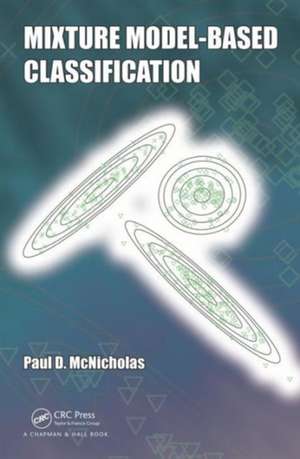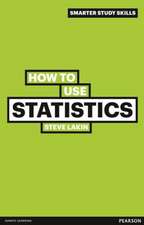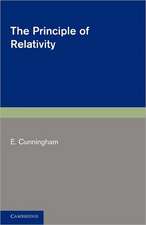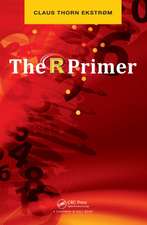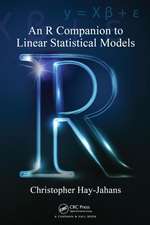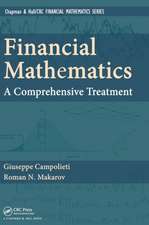Mixture Model-Based Classification
Autor Paul D. McNicholasen Limba Engleză Hardback – 19 aug 2016
Mixture Model-Based Classification is the first monograph devoted to mixture model-based approaches to clustering and classification. This is both a book for established researchers and newcomers to the field. A history of mixture models as a tool for classification is provided and Gaussian mixtures are considered extensively, including mixtures of factor analyzers and other approaches for high-dimensional data. Non-Gaussian mixtures are considered, from mixtures with components that parameterize skewness and/or concentration, right up to mixtures of multiple scaled distributions. Several other important topics are considered, including mixture approaches for clustering and classification of longitudinal data as well as discussion about how to define a cluster
Paul D. McNicholas is the Canada Research Chair in Computational Statistics at McMaster University, where he is a Professor in the Department of Mathematics and Statistics. His research focuses on the use of mixture model-based approaches for classification, with particular attention to clustering applications, and he has published extensively within the field. He is an associate editor for several journals and has served as a guest editor for a number of special issues on mixture models.
| Toate formatele și edițiile | Preț | Express |
|---|---|---|
| Paperback (1) | 312.43 lei 6-8 săpt. | |
| CRC Press – 18 dec 2020 | 312.43 lei 6-8 săpt. | |
| Hardback (1) | 497.37 lei 6-8 săpt. | |
| CRC Press – 19 aug 2016 | 497.37 lei 6-8 săpt. |
Preț: 497.37 lei
Preț vechi: 665.86 lei
-25% Nou
Puncte Express: 746
Preț estimativ în valută:
95.17€ • 99.63$ • 78.75£
95.17€ • 99.63$ • 78.75£
Carte tipărită la comandă
Livrare economică 05-19 aprilie
Preluare comenzi: 021 569.72.76
Specificații
ISBN-13: 9781482225662
ISBN-10: 1482225662
Pagini: 236
Ilustrații: 38
Dimensiuni: 156 x 234 x 18 mm
Greutate: 0.48 kg
Ediția:1
Editura: CRC Press
Colecția Chapman and Hall/CRC
ISBN-10: 1482225662
Pagini: 236
Ilustrații: 38
Dimensiuni: 156 x 234 x 18 mm
Greutate: 0.48 kg
Ediția:1
Editura: CRC Press
Colecția Chapman and Hall/CRC
Cuprins
Mixture Model-Based Classification
Notă biografică
Paul D. McNicholas is the Canada Research Chair in Computational Statistics at McMaster University, where he is a Professor in the Department of Mathematics and Statistics. His research focuses on the use of mixture model-based approaches for classification, with particular attention to clustering applications, and he has published extensively within the field. He is an associate editor for several journals and has served as a guest editor for a number of special issues on mixture models.
Recenzii
"This Monograph, “Mixture Model-Based Classification” is an excellent book, highly relevant to every statistician working with classification problems."
~International Society for Clinical Biostatistics
"This monograph is an extensive introduction of mixture models with applications in classification and clustering. . . The author did good work by organizing the materials in a very natural way as well as presenting methods and algorithms in great detail. Moreover, many case studies help the reader understand and appreciate the methodologies presented."
~Journal of the American Statistical Association
"I would recommend this book to anyone interested in learning about application of mixture models to classification problems."
~The International Biometric Society
~International Society for Clinical Biostatistics
"This monograph is an extensive introduction of mixture models with applications in classification and clustering. . . The author did good work by organizing the materials in a very natural way as well as presenting methods and algorithms in great detail. Moreover, many case studies help the reader understand and appreciate the methodologies presented."
~Journal of the American Statistical Association
"I would recommend this book to anyone interested in learning about application of mixture models to classification problems."
~The International Biometric Society
Descriere
This work addresses classification using mixture models broadly. Unlike traditional treatments of the subject that heavily focus on unsupervised approaches, this book gives attention to unsupervised, semi-supervised, and supervised classification paradigms. Case studies illustrate both non-Gaussian and Gaussian approaches to model selection.
